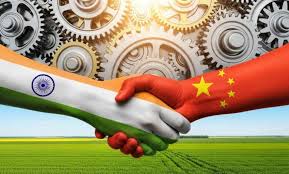
PM Modi: India, China Must Cooperate to Ensure Global Economic Stability

 :
| Updated On: 30-Aug-2025 @ 12:23 pm
:
| Updated On: 30-Aug-2025 @ 12:23 pmSHARE
Prime Minister Narendra Modi, in a written interview with the Japanese daily Yomiuri Shimbun, underlined the importance of India and China working together as two of the world’s largest economies to help stabilize the global economic order amidst current volatility. Stressing the need for “stable, predictable, and amicable” bilateral relations between India and China, he said that such cooperation could have a far-reaching positive impact on regional as well as global peace, prosperity, and stability. Modi argued that closer engagement between the two Asian giants is not only vital for their own development but also crucial for ensuring a multipolar Asia and a multipolar world order.
These remarks come ahead of Modi’s upcoming meetings with Chinese President Xi Jinping and Russian President Vladimir Putin on the sidelines of the Shanghai Cooperation Organisation (SCO) summit, beginning Sunday in Tianjin, near Beijing. The SCO summit assumes significance as it takes place at a delicate moment in India-China relations, with both countries trying to repair ties following a prolonged five-year military standoff along the Line of Actual Control (LAC) in eastern Ladakh. While New Delhi and Beijing remain cautious, Modi emphasized India’s willingness to improve relations from a “strategic and long-term perspective,” grounded in mutual respect, mutual interests, and sensitivity to each other’s concerns. He further stated that enhanced strategic communication between the two countries could help address developmental challenges.
At the same time, Modi’s meeting with Xi is taking place against a backdrop of tensions between India and the United States. Frictions with Washington have emerged over tariffs, India’s continued purchase of Russian oil despite Western sanctions, and hurdles in concluding a new trade deal. Modi’s interactions at the SCO, including his separate meeting with Russian President Putin, highlight India’s careful balancing act in its foreign policy, as it navigates complex global alignments and pressures.
Tracing the trajectory of India-China engagements, the article notes that Modi and Xi last met in October 2024 on the sidelines of the BRICS summit in Kazan, Russia. Earlier this month, Chinese Foreign Minister Wang Yi visited New Delhi and conveyed a formal invitation from Xi to Modi. Modi himself last travelled to China in June 2018 for the SCO summit in Qingdao. His present visits to Japan and China thus carry added weight, not only due to shifting geopolitical alignments but also because of the wide-ranging bilateral issues at play between these countries.
Beyond China, Modi also elaborated on India’s vision for a free and open Indo-Pacific and emphasized the importance of deepening cooperation with Japan to realize this vision. He stressed that India and Japan share a commitment to ensuring a peaceful, prosperous, and stable Indo-Pacific where the sovereignty and territorial integrity of nations are respected. Modi pointed out that, given China’s assertive and sometimes aggressive posturing in the Indo-Pacific—especially in sensitive areas like the South China Sea—India and Japan have steadily expanded their collaboration in the region.
The Prime Minister also observed that there is strong convergence between Japan’s “Free and Open Indo-Pacific” vision and India’s Indo-Pacific approach, encapsulated in initiatives such as “Vision MAHASAGAR” and the Indo-Pacific Oceans’ Initiative. He explained that both India and Japan enjoy extensive linkages with many Indo-Pacific countries and are actively working with some of them through plurilateral formats to advance shared objectives.
The late Japanese Prime Minister Shinzo Abe had been among the earliest global leaders to articulate the concept of a free and open Indo-Pacific during a speech in India’s Parliament in 2007. Modi’s remarks, therefore, also pay homage to the continuity and growing depth of India-Japan cooperation in this sphere.
Finally, Modi touched upon the importance of BRICS for India, noting its significance for economic and geopolitical cooperation among emerging powers. His comments come at a time when the grouping has been criticized by U.S. President Donald Trump, underlining the wider contestation over global economic and political institutions.
In sum, Modi’s remarks highlight India’s nuanced and multi-dimensional foreign policy. They emphasize stabilizing India-China ties, balancing relations with Russia and the U.S., strengthening Indo-Pacific partnerships with Japan, and advocating for multipolarity in both Asia and the global order.